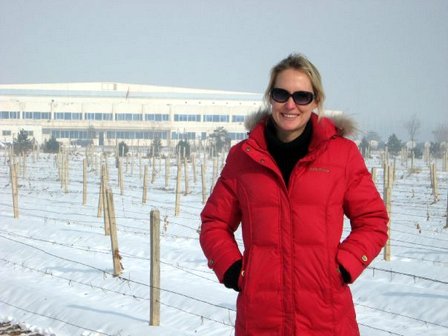By Jim Boyce
To give some perspective to winemakers interested in applying for the Ningxia Wine Challenge, we are featuring some interviews with people involved in the Ningxia wine scene. First up is winemaker Lillian Carter, who worked from August 2008 to December 2009 as winemaker / winery manager for Pernod Ricard at Helan Mountain winery, a joint project in Ningxia. Carter is now with Oakridge Wines in the Yarra Valley and has also worked at Domaine Chandon, also in the Yarra Valley, and Orlando Wines in the Barossa Valley.
~
What were the biggest adjustments for you in working in Ningxia?
Adjusting to a foreign language and culture, as well as a different way of working. Of course, it is always very challenging. It is also a hugely rewarding experience.
What kind of grapes and soil did you work with in Ningxia?
Generally the soils are sandy and poor quality but for grape vines this is not necessarily a bad thing. The red grape varieties of Cabernet Sauvignon and Cabernet Gernischt are by far the most commonly planted as the wines from these varieties are popular with consumers. Unfortunately they are late ripening varieties and are not especially suited to the climate of Ningxia, which has a short ripening window.
As the local wine industry matures, I would love to see vineyards planting lesser know varieties better suited to Ningxia’s climate. I’ve seen a few good examples of Shiraz and I’m sure it is a variety with potential for the region. Chardonnay and Ugni Blanc predominate amongst the white grape varietals, but overall, white grapes represent only a small percentage of grapes planted and wines made. I hope this will start to change as Ningxia Chardonnay has the capacity to make lovely wines.
What similarities did you find working in Ningxia and other parts of the world?
People involved in growing and making wine are incredibly warm, generous and passionate — no mater where in the world you are. Also, largely the technologies and wine-making equipment available are similar.
What was the one thing you did that most improved the wine?
We simply identified sections of the vineyard that had the greatest potential. We worked closely with the farmers, in the lead up to the growing season and we harvested the grapes when they tasted full of flavour, without any green characters.
Did you find there are any specific characteristics in well-made Ningxia wines?
It is pretty easy to produce a ‘well-made wine‘. It’s much harder to craft wine that reflects the environment where the grapes are grown. For a wine to truly express a sense of place the fruit must be in good condition and the grapes and wine should be handled appropriately in the winery. Too many wines from Ningxia are harvested when they are not phenologically ripe so it is impossible to find the true terroir in the wine. Once this problem is overcome, you will see wines that show the real personality of Ningxia.
What was your favorite Ningxia food to eat with your wines?
There are far too many! The lamb dishes were delicious, but now that I am back in Australia, I really miss the fried green beans and pork, which is seasoned with peppercorns and other spices.
What would be your advice to a foreign winemaker who is going to work in Ningxia?
Leave you preconceptions at the airport. Spend time reading about China’s long history, understanding the people and the region’s many dishes. Take a Chinese language course to help understand the basics, and try to practice, even if the waiter laughs at your attempts to order noodles. And visit the Xia imperial tombs and the remnants of the Great Wall that exist in Ningxia.

Grape Wall has no sponsors of advertisers: if you find the content and projects like World Marselan Day worthwhile, please help cover the costs via PayPal, WeChat or Alipay.
Sign up for the free Grape Wall newsletter here. Follow Grape Wall on LinkedIn, Instagram, Facebook and Twitter. And contact Grape Wall via grapewallofchina (at) gmail.com.


Leave a Reply
You must be logged in to post a comment.